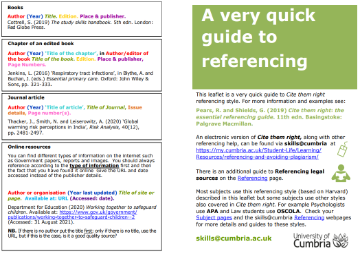In line with the principles of academic integrity and the academic regulations, all work submitted for assessment by students needs to be your own work.
As outlined on the Malpractice page, when you submit work for assessment, you are required to include a declaration that you have followed these guidelines and that the work is your own, including a bibliography and references that show how you have used the work of others. The material referenced must include everything you have used, for example words, images, film or audio found in printed books and journals, content accessed online, material generated by any online service or Artificial Intelligence, and information received through personal contacts (such as interviews and surveys).
University of Cumbria regulations define malpractice as:"as any attempt by a student to gain an unfair advantage in assessment... includes all forms of cheating, plagiarism, collusion, fabrication and falsification and impersonation”.
The main types of malpractice outlined within the University’s regulations include:
- Cheating in examinations
- Plagiarism
- Collusion with other students in coursework
- Fabrication and falsification
- Presenting for assessment content generated through artificial intelligence as your own
- Impersonation including the use of essay mills or ghost writing services, or having work written by friends or family
Cite them Right Online defines plagiarism as: “Taking and using another person's thoughts, writings or inventions as your own without acknowledging or citing the source of the ideas and expressions. In the case of copyrighted material, plagiarism is illegal.”
University Procedures and Processes for Academic Malpractice 5.2.1 say: "Plagiarism consists of unacknowledged use of someone else’s work and attempting to pass it off as one’s own. It includes the representation of work: written, visual, practical or otherwise, of any other person, including another student or anonymous web-based material, or any institution, as the candidate’s own."
Generative Artificial Intelligence
A recent area of development is the availability of generative AI tools such as ChatGPT and Google Bard. There may be legitimate uses of generative AI in your subject area and you can discuss these with your tutors. Guidance on how to cite and reference legitimate uses of generative AI is now available via Cite them Right online.
Generative AI tools should be used with caution as there are serious limitations to some of the content they generate currently, such as drawing on biased, inaccurate sources and making up references that don't exist.
Using AI to generate work that is submitted for assessment without any acknowledgement and against any directives from tutors, is a form of malpractice. Where it is suspected that AI has been used when it shouldn’t have, or it has not been credited through appropriate referencing, the standard University academic malpractice procedures will be used.
As this is a constantly evolving and complex area, please visit our dedicated webpage: Generative Artificial Intelligence.
Contract cheating
Contract cheating involves students paying money to companies (often called essay mills) for an assignment written by someone else and students then submitting this work as their own. These companies deliberately target and befriend students, eg via social media platforms, sometimes adopting University colours and branding to appear legitimate. These companies have been known to extort further money from students and graduates by threatening to contact universities, employers and professional bodies.
Watch this video about the serious consequences of contract cheating: Academic Integrity and Contract Cheating
Essentially, if you submit an assignment written by someone else or generated by something else, it is malpractice. This has serious consequences, not just for your university studies, but potentially for your life beyond university as well.
Academic integrity means graduating with pride
Very few students set out to try to cheat their way to a qualification. Some find themselves struggling for all sorts of reasons and start to believe that the only way out is something like an essay mill or a bot. If you are finding assignments challenging, feeling overwhelmed by deadlines, or something is happening for you that might make you vulnerable to malpractice, seek support. Don't take a step you'll later regret, talk to someone. This might be a friend, family member, tutor, the skills@cumbria team, the Student Union. If you're not sure who to talk to, make a self referral via the Student Enquiry Point. You're not on your own. We're here to support you and we want you to graduate with a sense of achievement, pride, and with your academic integrity intact.






